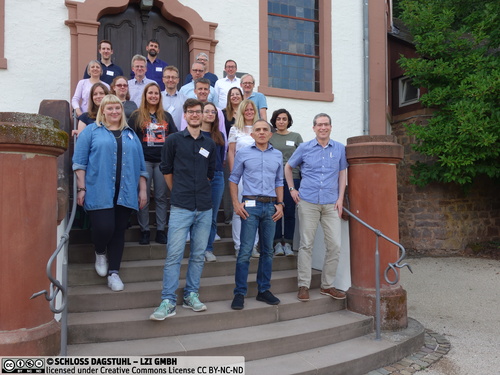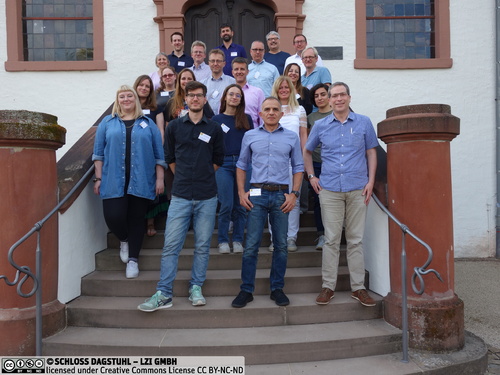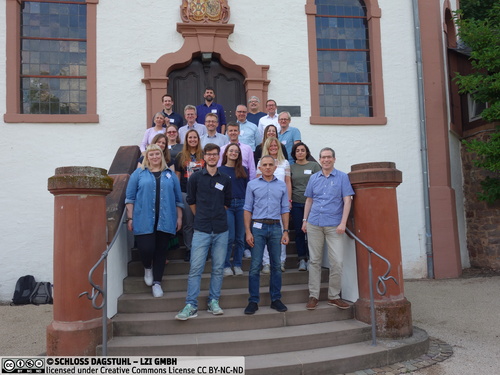Dagstuhl Seminar 22361
Challenges and Opportunities of Democracy in the Digital Society
( Sep 04 – Sep 09, 2022 )
Permalink
Organizers
- Abraham Bernstein (Universität Zürich, CH)
- Anita Gohdes (Hertie School of Governance - Berlin, DE)
- Beth Simone Noveck (New York University, US)
- Steffen Staab (Universität Stuttgart, DE)
Contact
- Andreas Dolzmann (for scientific matters)
- Simone Schilke (for administrative matters)
Schedule
In this Dagstuhl Seminar, we aimed to have interdisciplinary discussions on the challenges and opportunities of online platforms, online participation, and online deliberation, including experts in politics, law, technology, governance, and policy-making.
In order to achieve a thorough integration of perspectives, we started the first day of the seminar with several keynote talks by scholars from political science, computer science, communication and law. The keynote speakers were Fabrizio Gilardi (Universität Zürich), Anna de Liddo (Open University), Pablo Aragón (Wikimedia Foundation), Eleni Kyza (Cyprus University of Technology), and Felix Uhlmann (Universität Zürich). After these talks, the seminar organized a brainstorming session to identify key discussion topics related to democracy in the digital society. Based on these discussion topics, the participants worked on six breakout sessions: Goals, Actors, Narratives and Bias, Structure, Technology, and Success Metrics. Additionally, throughout the seminar, Markus Brill (Technical University of Berlin), Abraham Bernstein (Universität Zürich), Róbert Bjarnason (Citizens Foundation), Gefion Thürmer (King’s College London), Gianluca Demartini (University of Queensland), and Harith Alani (Open University) gave short presentations on various topics including computational social choice, diversity in news recommender systems, citizen science, and misinformation.
The remainder of this report provides the abstracts of the talks and the group discussions.
 Abraham Bernstein, Anita Gohdes, Christina Sarasua, and Steffen Staab
Abraham Bernstein, Anita Gohdes, Christina Sarasua, and Steffen Staab
Digital technologies amplify and change societal processes. So far, society and intellectuals have painted two extremes of viewing the effects of the digital transformation on democratic life. While the early 2000s to mid-2010s declared the "liberating" aspects of digital technology, the post-Brexit events and 2016 US elections have emphasized the "dark side"of the digital revolution. Now, explicit effort is needed to go beyond tech saviorism or doom scenarios.
In this Dagstuhl Seminar, we aim to have interdisciplinary discussions on the challenges and opportunities of online platforms, online participation, and online deliberation, including experts in computer science, political science, sociology, communication, law, governance, and policy-making.
In order to achieve a thorough integration of perspectives, we will start the first day of the seminar with several keynote talks by scholars and practitioners. After these talks, the seminar will organize breakout sessions as a vehicle for engaging diverse participants into focused discussions. Breakout sessions will be structured according to the five pillars of E-Democracy, suggested by the Manifesto for Digital Democracy https://digital-manifest.ch: 1) Safeguards, 2) Involvement, 3) Co-Design, 4) Stability, and 5) Experimental Testing. In between these breakout group sessions, the seminar will additionally interject "overview sessions" from different disciplines with requirement-giving "mpulses" from practitioners (politicians, NGOs, activists) in order to retain the overall focus on real-life problems and to not lose the intended approach of pragmatism and problem-solving. On the last day of the seminar, the program will include a joint session to summarize the discussed topics and define an integrated outcome.
Through this pragmatic approach, where real challenges are matched to opportunities, we aim to yield integrated research agendas, common problem definitions, and next-step implementation and dissemination strategies relevant to scientific research project officers and governmental entities. As a result, the seminar will define goals for enabling and regulating democracy in the digital society and formulate strategic project ideas to be submitted to national and international policy-makers.
 Abraham Bernstein, Anita Gohdes, Beth Simone Noveck, and Steffen Staab
Abraham Bernstein, Anita Gohdes, Beth Simone Noveck, and Steffen Staab
- Harith Alani (The Open University - Milton Keynes, GB) [dblp]
- Pablo Aragón (Wikimedia Foundation - Barcelona, ES) [dblp]
- Fynn Bachmann (Universität Zürich, CH)
- Abraham Bernstein (Universität Zürich, CH) [dblp]
- Markus Brill (TU Berlin, DE) [dblp]
- Anna De Liddo (The Open University - Milton Keynes, GB) [dblp]
- Martin Emmer (FU Berlin, DE) [dblp]
- Fabrizio Gilardi (Universität Zürich, CH)
- Anita Gohdes (Hertie School of Governance - Berlin, DE)
- Lynda Hardman (CWI - Amsterdam, NL & Utrecht University, NL) [dblp]
- Farane Jalali (MPI für Informatik - Saarbrücken, DE)
- Eleni Kyza (Cyprus University of Technology - Limassol, CY)
- Jörn Lamla (Universität Kassel, DE)
- Libor Pavlícek (Charles University - Prague, CZ)
- Catarina Pereira (Universität Zürich, CH)
- Cristina Sarasua (Universität Zürich, CH) [dblp]
- Steffen Staab (Universität Stuttgart, DE) [dblp]
- Marco Steenbergen (Universität Zürich, CH)
- Gefion Thuermer (King's College London, GB)
- Miklovana Tuci (Universität Zürich, CH)
- Felix Uhlmann (Universität Zürich, CH)
- Robert Bjarnason (Citizens Foundation Iceland - Reykjavik, IS)
- Soon Ae Chun (CUNY College of Staten Island, US) [dblp]
- Gianluca Demartini (The University of Queensland - Brisbane, AU) [dblp]
- Karsten Donnay (Universität Zürich, CH)
- Andreas Jungherr (Universität Bamberg, DE) [dblp]
- Valeria Vuk (Universität Zürich, CH)
Classification
- Computers and Society
- Other Computer Science
- Social and Information Networks
Keywords
- Society
- Democratic Regulation
- Large-scale Deliberation
- Large-scale decision making
- Co-Design




 Creative Commons BY 4.0
Creative Commons BY 4.0
